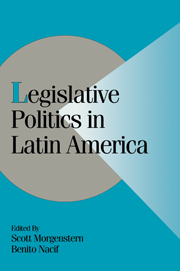Book contents
- Frontmatter
- Contents
- Tables and Figures
- Contributors
- Preface and Acknowledgments
- Party Names and Other Acronyms and Abbreviations
- 1 TOWARDS A MODEL OF LATIN AMERICAN LEGISLATURES
- Part I Executive–Legislative Relations
- Part II Political Parties and Legislative Structure
- Part III Legislatures and the Policy Process
- Part IV Conclusions
- References
- Author Index
- General Index
Preface and Acknowledgments
Published online by Cambridge University Press: 14 January 2010
- Frontmatter
- Contents
- Tables and Figures
- Contributors
- Preface and Acknowledgments
- Party Names and Other Acronyms and Abbreviations
- 1 TOWARDS A MODEL OF LATIN AMERICAN LEGISLATURES
- Part I Executive–Legislative Relations
- Part II Political Parties and Legislative Structure
- Part III Legislatures and the Policy Process
- Part IV Conclusions
- References
- Author Index
- General Index
Summary
Before 1997 few were studying the Mexican Congress, let alone other legislatures in Latin America. In 1996, however, the opposition parties in Mexico were poised to wrestle the PRI for control of the Congress for the first time, which they succeeded in doing the following year. Understandably, this generated tremendous interest in legislative politics not only among academics, but also in the business world, the press, and the general public.
At that time the two of us were working in the Centro de Investigación y Docencia Económicas (CIDE) in Mexico City. Blanca Heredia and Carlos Elizondo, the academic secretary and general director of CIDE respectively, charged the two of us with organizing an international conference of our own design. We both had recently finished dissertations related to legislative politics and realized that bringing in other experts could provide the field much fuller descriptions and richer analyses than our own individual work. Further, Mainwaring and Shugart had been working on their volume on presidentialism in Latin America, and we saw an opportunity to complement their valuable study.
Our first challenge was in defining the scope of our study. In this we relied on the División de Estudios Politicos (Political Studies Division) of CIDE, where we first presented our ideas. The first drafts of the proposal covered many countries and themes. We were forced, therefore, into a tradeoff between depth and breadth. We opted for the former, as it allowed us to add theoretical rigor to studies of Latin American politics. Having made this decision, we settled on addressing two main theoretical issues, executive–legislative relations and legislative organization, with a third section showing how these issues shape the policy process.
- Type
- Chapter
- Information
- Legislative Politics in Latin America , pp. xvii - xviiiPublisher: Cambridge University PressPrint publication year: 2002

